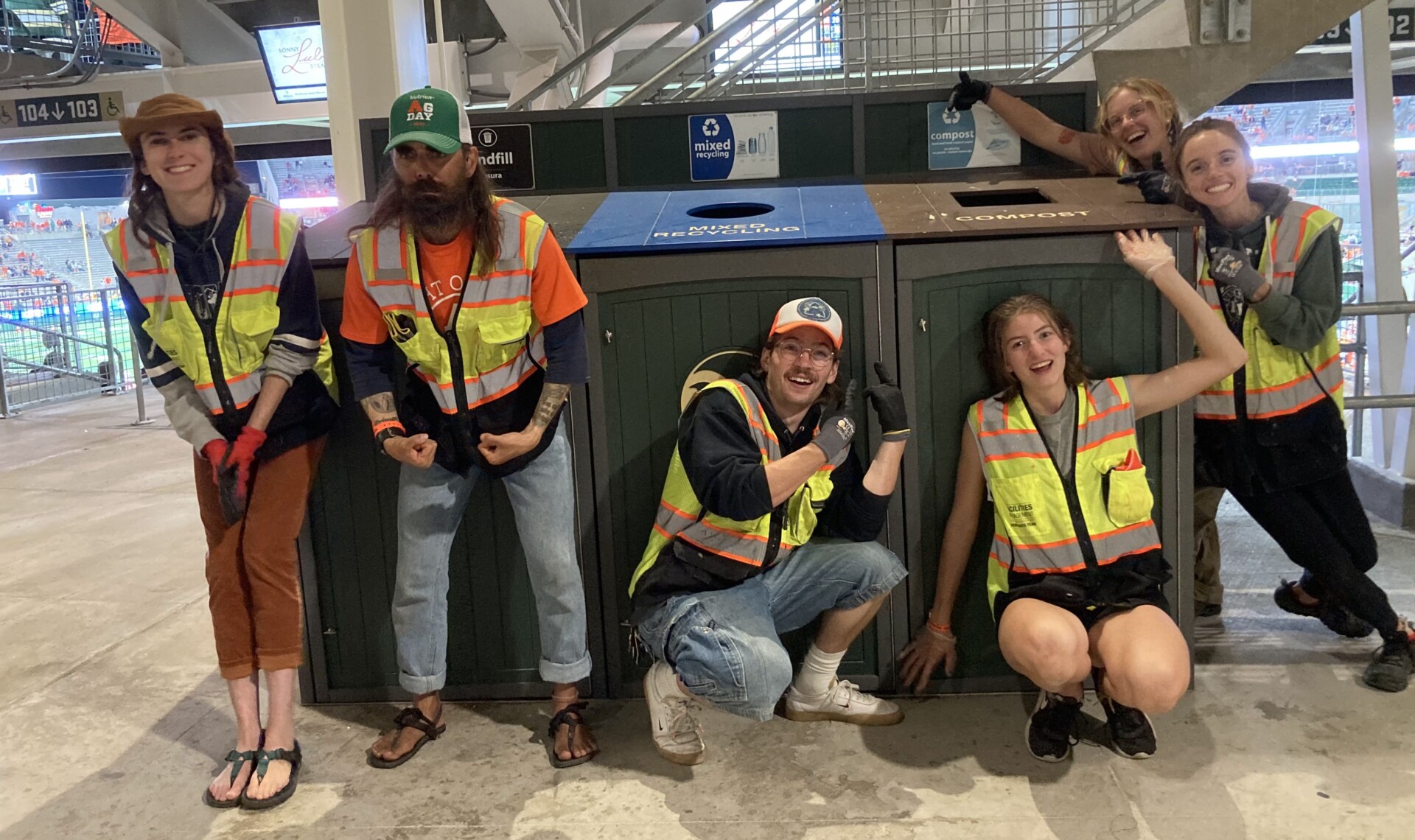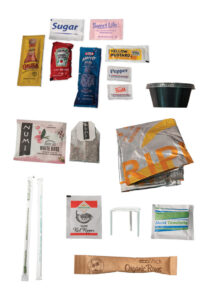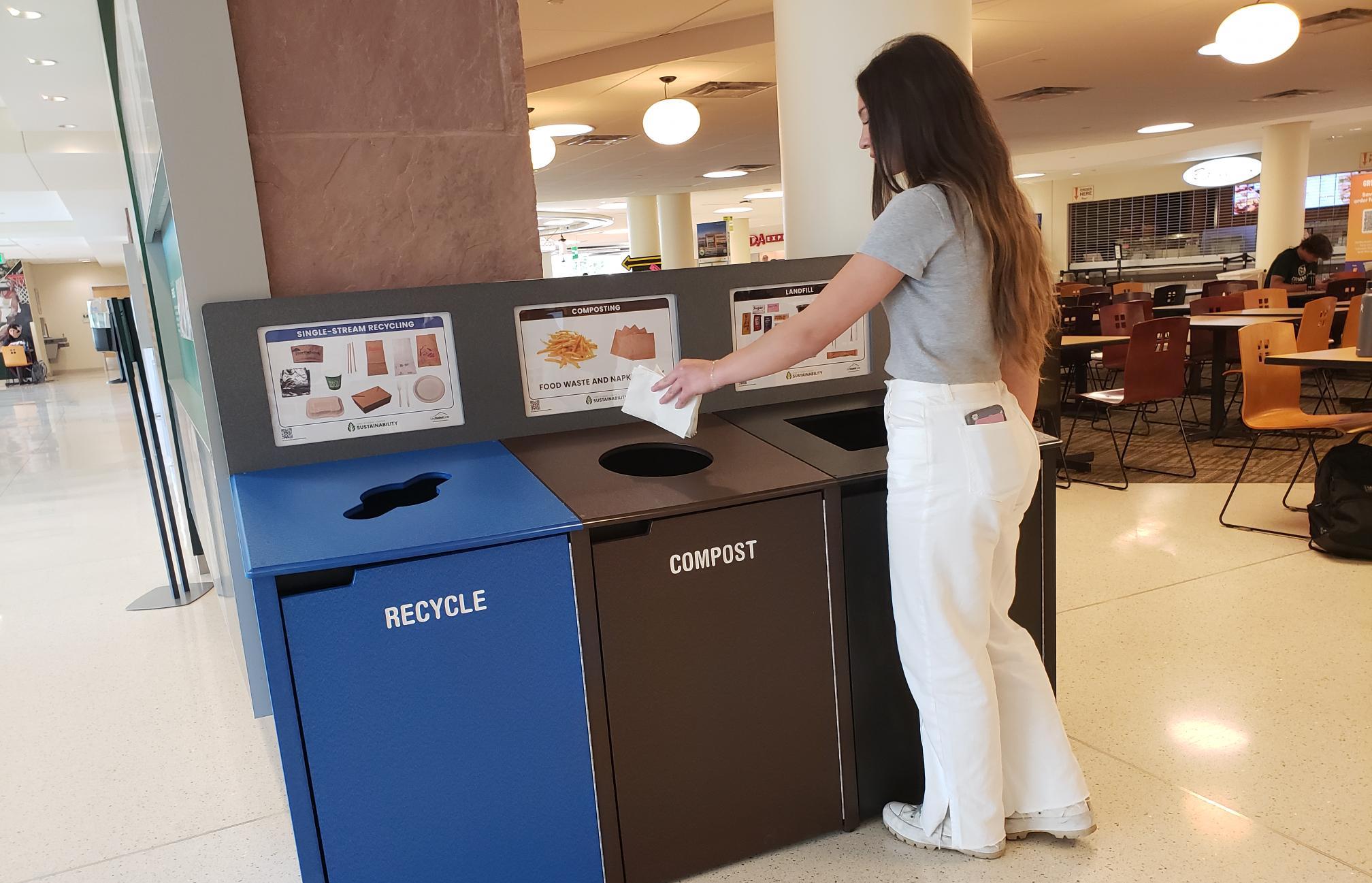
Members of the Zero Waste Team pose after the Sept. 30 home football game. They were preparing for a final sort before emptying the bins for the night. From left are Quinn Mitchell, Lief Youngs, Ethan LaBorde, Ashlee Ducharme, Mckenna Skokos and Arysa Puckett.
Did you know that composting is one of the easiest ways to reduce the waste stream on campus? And that you can make a big difference in supporting CSU’s sustainability initiatives in just 15 seconds over lunch?
The LSC now offers composting bins alongside recycling and landfill bins in the Food Court, with pictures to help guide sorting. The bins, separated in three color-coded, 38-gallon sections, will be staffed from 11 a.m. to 2 p.m. and 5 to 7 p.m. weekdays by attendants trained to answer questions about how to use the bins.
The bins match the colors used in the residential dining facilities, with brown for composting, black for landfill and blue for recycling. Given the wide variety of food packaging at the LSC, composting will begin with food and napkin collection. Guides above each bin list specific items appropriate for each bin. If in doubt, users are asked to place items in the landfill bin to avoid contamination.

‘Clean’ streams
“It’s important to have ‘clean’ streams, as we don’t want to contaminate the compost with plastics or metals,” said Arysa Puckett, social media manager of the Zero Waste Team (ZWT), a student-led group working to reduce waste on campus. Puckett, also a CSU composting intern, worked with other ZWT and Associated Students of Colorado State University (ASCSU) members to identify which materials in the LSC were compostable.
“Education is paramount for this new composting project,” Puckett said. “We have been working with ASCSU and its environmental affairs directors for the past few years, volunteering our time to help table in the LSC. We spent a few days each week in the LSC talking to students about their level of interest in composting.”
The addition of composting bins, which will enhance the sustainability efforts already underway at the LSC, is the third phase of the composting program at the LSC. The previous two phases included back-of-the-house efforts (composting of leftover food items, coffee grounds, coffee filters and paper towels) and the front-of-the-house pilot program, which aimed to educate and encourage interest among students, staff and other visitors to the LSC.
Student-driven effort
“This is a combined effort between ASCSU and LSC Operations,” said Nancy Cowley, environmental services manager for LSC Operations. “Students requested this program and followed through to make it happen.”
In fact, ASCSU’s pilot program has been so successful that in April of this year, students voted to recommend the purchase of the compost bins to the Student Fees Review Board. If all goes well, Cowley said the LSC has plans to expand composting efforts in the LSC by adding two additional sorting stations in the Food Court and bringing the Ramskeller Pub onboard by mid-spring of 2024.
“We’re hoping it eventually doubles the amount of composting we do now,” Cowley said.
As it stands, LSC back-of-the-house venues fill eight 65-gallon poly carts with compostable material twice a week, Cowley said, and the Ramskeller Brewhouse, which hosts the Fermentation Science and Technology program labs, collects all its spent grains. All this material is trucked to the Windrow Farm at the CSU Foothills Campus and converted to compost, which ultimately is offered back to the CSU community and used by the student farm, community nonprofit organizations and as soil amendments for new construction at CSU.

Third-year marketing student Natalie Cattany places a napkin into one of the two new composting bins at the LSC’s Food Court.
Composting food waste
Post-consumer food waste from the LSC and CSU dining centers is also composted at the Windrow, which is managed by CSU Facilities Management. A second composting facility called the Earth Flow, or “Oscar,” composts pre-consumer food waste from CSU dining centers. This composting center, facilitated by Facilities Management and Housing & Dining Services at CSU’s Foothills Campus, reroutes more than 300,000 pounds of food waste from the landfill each year.
According to Jennifer Williams, integrated solid waste program manager at the Foothills Campus, CSU as a whole composted 1,115 tons in 2021, 1,327 tons in 2022, and 702 tons in January through June of 2023.
“Composting provides a way for individuals to recycle organic matter naturally and more sustainably, so that the matter may break down into fertile soil,” said LSC Governing Board President Macie Lynch. “Therefore, I believe that composting will complement recycling efforts in the LSC in that those who frequent the building will have the opportunity to participate in the sustainable waste management processes the LSC is striving for.”
‘Educating the next generation’
Organizers of the program hope it helps establish new sustainability habits for students, staff and visitors to the LSC.
“Programs like this – recycling, composting, reusing – if done right, ingrain those good habits, and that’s what our goal is. And those people involved can feel good about not sending so much to the dump and know they had a hand in educating the next generation in how to be green,” Cowley said.
The next generation is eager to participate, and already thinking of opportunities ahead.
“My goal is to raise awareness about food waste, but I also aim to push CSU toward a more sustainable campus,” Puckett said. “Adding compost to the LSC is a great start, but I would love to see a reduction in single-use plastics generally at CSU.”